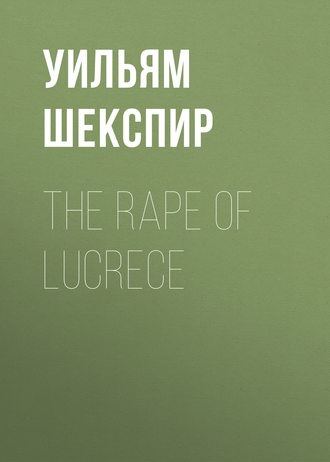полная версия

Уильям Шекспир
The Rape of Lucrece
To find some desperate instrument of death:
But this no slaughter-house no tool imparteth,
To make more vent for passage of her breath;
Which, thronging through her lips, so vanisheth
As smoke from Aetna, that in air consumes,
Or that which from discharged cannon fumes.
'In vain,' quoth she, 'I live, and seek in vain
Some happy mean to end a hapless life.
I fear'd by Tarquin's falchion to be slain,
Yet for the self-same purpose seek a knife:
But when I fear'd I was a loyal wife:
So am I now: – O no, that cannot be;
Of that true type hath Tarquin rifled me.
'O! that is gone for which I sought to live,
And therefore now I need not fear to die.
To clear this spot by death, at least I give
A badge of fame to slander's livery;
A dying life to living infamy;
Poor helpless help, the treasure stolen away,
To burn the guiltless casket where it lay!
'Well, well, dear Collatine, thou shalt not know
The stained taste of violated troth;
I will not wrong thy true affection so,
To flatter thee with an infringed oath;
This bastard graff shall never come to growth:
He shall not boast who did thy stock pollute
That thou art doting father of his fruit.
Nor shall he smile at thee in secret thought,
Nor laugh with his companions at thy state;
But thou shalt know thy interest was not bought
Basely with gold, but stolen from forth thy gate.
For me, I am the mistress of my fate,
And with my trespass never will dispense,
Till life to death acquit my forced offence.
'I will not poison thee with my attaint,
Nor fold my fault in cleanly-coin'd excuses;
My sable ground of sin I will not paint,
To hide the truth of this false night's abuses;
My tongue shall utter all; mine eyes, like sluices,
As from a mountain-spring that feeds a dale,
Shall gush pure streams to purge my impure tale.'
By this; lamenting Philomel had ended
The well-tun'd warble of her nightly sorrow,
And solemn night with slow-sad gait descended
To ugly hell; when, lo, the blushing morrow
Lends light to all fair eyes that light will borrow:
But cloudy Lucrece shames herself to see,
And therefore still in night would cloister'd be.
Revealing day through every cranny spies,
And seems to point her out where she sits weeping,
To whom she sobbing speaks: 'O eye of eyes,
Why pryest thou through my window? leave thy peeping;
Mock with thy tickling beams eyes that are sleeping:
Brand not my forehead with thy piercing light,
For day hath nought to do what's done by night.'
Thus cavils she with every thing she sees:
True grief is fond and testy as a child,
Who wayward once, his mood with nought agrees.
Old woes, not infant sorrows, bear them mild;
Continuance tames the one: the other wild,
Like an unpractis'd swimmer plunging still
With too much labour drowns for want of skill.
So she, deep-drenched in a sea of care,
Holds disputation with each thing she views,
And to herself all sorrow doth compare;
No object but her passion's strength renews;
And as one shifts, another straight ensues:
Sometime her grief is dumb and hath no words;
Sometime 'tis mad, and too much talk affords.
The little birds that tune their morning's joy
Make her moans mad with their sweet melody.
For mirth doth search the bottom of annoy;
Sad souls are slain in merry company:
Grief best is pleas'd with grief's society:
True sorrow then is feelingly suffic'd
When with like semblance it is sympathiz'd.
'Tis double death to drown in ken of shore;
He ten times pines that pines beholding food;
To see the salve doth make the wound ache more;
Great grief grieves most at that would do it good;
Deep woes roll forward like a gentle flood;
Who, being stopp'd, the bounding banks o'erflows;
Grief dallied with nor law nor limit knows.
'You mocking birds,' quoth she, 'your tunes entomb
Within your hollow-swelling feather'd breasts,
And in my hearing be you mute and dumb!
(My restless discord loves no stops nor rests;
A woeful hostess brooks not merry guests:)
Relish your nimble notes to pleasing ears;
Distress likes dumps when time is kept with tears.
'Come, Philomel, that sing'st of ravishment,
Make thy sad grove in my dishevell'd hair:
As the dank earth weeps at thy languishment,
So I at each sad strain will strain a tear,
And with deep groans the diapason bear:
For burthen-wise I'll hum on Tarquin still,
While thou on Tereus descant'st better skill.
'And whiles against a thorn thou bear'st thy part,
To keep thy sharp woes waking, wretched I,
To imitate thee well, against my heart
Will fix a sharp knife, to affright mine eye;
Who, if it wink, shall thereon fall and die.
These means, as frets upon an instrument,
Shall tune our heart-strings to true languishment.
'And for, poor bird, thou sing'st not in the day,
As shaming any eye should thee behold,
Some dark deep desert, seated from the way,
That knows not parching heat nor freezing cold,
Will we find out; and there we will unfold
To creatures stern sad tunes, to change their kinds:
Since men prove beasts, let beasts bear gentle minds.'
As the poor frighted deer, that stands at gaze,
Wildly determining which way to fly,
Or one encompass'd with a winding maze,
That cannot tread the way out readily;
So with herself is she in mutiny,
To live or die which of the twain were better,
When life is sham'd, and Death reproach's debtor.
'To kill myself,' quoth she, 'alack! what were it,
But with my body my poor soul's pollution?
They that lose half with greater patience bear it
Than they whose whole is swallow'd in confusion.
That mother tries a merciless conclusion
Who, having two sweet babes, when death takes one,
Will slay the other, and be nurse to none.
'My body or my soul, which was the dearer,
When the one pure, the other made divine?
Whose love of either to myself was nearer?
When both were kept for heaven and Collatine?
Ah, me! the bark peel'd from the lofty pine,
His leaves will wither, and his sap decay;
So must my soul, her bark being peel'd away.
'Her house is sack'd, her quiet interrupted,
Her mansion batter'd by the enemy;
Her sacred temple spotted, spoil'd, corrupted,
Grossly engirt with daring infamy:
Then let it not be call'd impiety,
If in this blemish'd fort I make some hole
Through which I may convey this troubled soul.
'Yet die I will not till my Collatine
Have heard the cause of my untimely death;
That he may vow, in that sad hour of mine,
Revenge on him that made me stop my breath.
My stained blood to Tarquin I'll bequeath,
Which by him tainted shall for him be spent,
And as his due writ in my testament.
'My honour I'll bequeath unto the knife
That wounds my body so dishonoured.
'Tis honour to deprive dishonour'd life;
The one will live, the other being dead:
So of shame's ashes shall my fame be bred;
For in my death I murther shameful scorn:
My shame so dead, mine honour is new-born.
'Dear lord of that dear jewel I have lost,
What legacy shall I bequeath to thee?
My resolution, Love, shall be thy boast,
By whose example thou reveng'd mayst be.
How Tarquin must be used, read it in me:
Myself, thy friend, will kill myself, thy foe,
And, for my sake, serve thou false Tarquin so.
'This brief abridgement of my will I make:
My soul and body to the skies and ground;
My resolution, husband, do thou take;
Mine honour be the knife's that makes my wound;
My shame be his that did my fame confound;
And all my fame that lives disburs'd be
To those that live, and think no shame of me.
'Thou, Collatine, shalt oversee this will;
How was I overseen that thou shalt see it!
My blood shall wash the slander of mine ill;
My life's foul deed my life's fair end shall free it.
Faint not, faint heart, but stoutly say "so be it:"
Yield to my hand; my hand shall conquer thee;
Thou dead, both die, and both shall victors be.'
This plot of death when sadly she had laid,
And wip'd the brinish pearl from her bright eyes,
With untun'd tongue she hoarsely call'd her maid,
Whose swift obedience to her mistress hies;
For fleet-wing'd duty with thought's feathers flies.
Poor Lucrece' cheeks unto her maid seem so
As winter meads when sun doth melt their snow.
Her mistress she doth give demure good-morrow,
With soft-slow tongue, true mark of modesty,
And sorts a sad look to her lady's sorrow,
(For why her face wore sorrow's livery,)
But durst not ask of her audaciously
Why her two suns were cloud-eclipsed so,
Nor why her fair cheeks over-wash'd with woe.
But as the earth doth weep, the sun being set,
Each flower moisten'd like a melting eye;
Even so the maid with swelling drops 'gan wet
Her circled eyne, enforc'd by sympathy
Of those fair suns, set in her mistress' sky,
Who in a salt-wav'd ocean quench their light,
Which makes the maid weep like the dewy night.
A pretty while these pretty creatures stand,
Like ivory conduits coral cisterns filling:
One justly weeps; the other takes in hand
No cause, but company, of her drops spilling:
Their gentle sex to weep are often willing:
Grieving themselves to guess at others' smarts,
And then they drown their eyes or break their hearts.
For men have marble, women waxen minds,
And therefore are they form'd as marble will;
The weak oppress'd, the impression of strange kinds
Is form'd in them by force, by fraud, or skill:
Then call them not the authors of their ill,
No more than wax shall be accounted evil,
Wherein is stamp'd the semblance of a devil.
Their smoothness, like a goodly champaign plain,
Lays open all the little worms that creep;
In men, as in a rough-grown grove, remain
Cave-keeping evils that obscurely sleep:
Through crystal walls each little mote will peep:
Though men can cover crimes with bold stern looks,
Poor women's faces are their own faults' books.
No man inveigb against the wither'd flower,
But chide rough winter that the flower hath kill'd!
Not that devour'd, but that which doth devour,
Is worthy blame. O, let it not be hild
Poor women's faults, that they are so fulfill'd
With men's abuses! those proud lords, to blame,
Make weak-made women tenants to their shame.
The precedent whereof in Lucrece view,
Assail'd by night with circumstances strong
Of present death, and shame that might ensue
By that her death, to do her husband wrong:
Such danger to resistance did belong;
The dying fear through all her body spread;
And who cannot abuse a body dead?
By this, mild Patience bid fair Lucrece speak
To the poor counterfeit of her complaining:
'My girl,' quoth she, 'on what occasion break
Those tears from thee, that down thy cheeks are raining?
If thou dost weep for grief of my sustaining,
Know, gentle wench, it small avails my mood:
If tears could help, mine own would do me good.
'But tell me, girl, when went' – (and there she stay'd
Till after a deep groan) 'Tarquin from, hence?'
'Madam, ere I was up,' replied the maid,
'The more to blame my sluggard negligence:
Yet with the fault I thus far can dispense;
Myself was stirring ere the break of day,
And, ere I rose, was Tarquin gone away.
'But, lady, if your maid may be so bold,
She would request to know your heaviness.'
'O peace!' quoth Lucrece: 'if it should be told,
The repetition cannot make it less;
For more it is than I can well express:
And that deep torture may be call'd a hell,
When more is felt than one hath power to tell.
'Go, get me hither paper, ink, and pen —
Yet save that labour, for I have them here.
What should I say? – One of my husband's men
Bid thou be ready, by and by, to bear
A letter to my lord, my love, my dear;
Bid him with speed prepare to carry it;
The cause craves haste, and it will soon be writ.'
Her maid is gone, and she prepares to write,
First hovering o'er the paper with her quill:
Conceit and grief an eager combat fight;
What wit sets down is blotted straight with will;
This is too curious-good, this blunt and ill:
Much like a press of people at a door,
Throng her inventions, which shall go before.
At last she thus begins: – 'Thou worthy lord
Of that unworthy wife that greeteth thee,
Health to thy person! next vouchsafe to afford
(If ever, love, thy Lucrece thou wilt see)
Some present speed to come and visit me:
So, I commend me from our house in grief:
My woes are tedious, though my words are brief.'
Here folds she up the tenor of her woe,
Her certain sorrow writ uncertainly.
By this short schedule Collatine may know
Her grief, but not her grief's true quality;
She dares not thereof make discovery,
Lest he should hold it her own gross abuse,
Ere she with blood had stain'd her stain'd excuse.
Besides, the life and feeling of her passion
She hoards, to spend when he is by to hear her;
When sighs, and groans, and tears may grace the fashion
Of her disgrace, the better so to clear her
From that suspicion which the world my might bear her.
To shun this blot, she would not blot the letter
With words, till action might become them better.
To see sad sights moves more than hear them told;
For then the eye interprets to the ear
The heavy motion that it doth behold,
When every part a part of woe doth bear.
'Tis but a part of sorrow that we hear:
Deep sounds make lesser noise than shallow fords,
And sorrow ebbs, being blown with wind of words.
Her letter now is seal'd, and on it writ
'At Ardea to my lord with more than haste;'
The post attends, and she delivers it,
Charging the sour-fac'd groom to hie as fast
As lagging fowls before the northern blast.
Speed more than speed but dull and slow she deems:
Extremely still urgeth such extremes.
The homely villain court'sies to her low;
And, blushing on her, with a steadfast eye
Receives the scroll, without or yea or no,
And forth with bashful innocence doth hie.
But they whose guilt within their bosoms lie
Imagine every eye beholds their blame;
For Lucrece thought he blush'd to see her shame:
When, silly groom! God wot, it was defect
Of spirit, life, and bold audacity.
Such harmless creatures have a true respect
To talk in deeds, while others saucily
Promise more speed, but do it leisurely:
Even so this pattern of the worn-out age
Pawn'd honest looks, but laid no words to gage.
His kindled duty kindled her mistrust,
That two red fires in both their faces blaz'd;
She thought he blush'd, as knowing Tarquin's lust,
And, blushing with him, wistly on him gaz'd;
Her earnest eye did make him more amaz'd:
The more saw the blood his cheeks replenish,
The more she thought he spied in her some blemish.
But long she thinks till he return again,
And yet the duteous vassal scarce is gone.
The weary time she cannot entertain,
For now 'tis stale to sigh, to weep, to groan:
So woe hath wearied woe, moan tired moan,
That she her plaints a little while doth stay,
Pausing for means to mourn some newer way.
At last she calls to mind where hangs a piece
Of skilful painting, made for Priam's Troy;
Before the which is drawn the power of Greece,
For Helen's rape the city to destroy,
Threat'ning cloud-kissing Ilion with annoy;
Which the conceited painter drew so proud,
As heaven (it seem'd) to kiss the turrets bow'd.
A thousand lamentable objects there,
In scorn of Nature, Art gave lifeless life:
Many a dry drop seem'd a weeping tear,
Shed for the slaughter'd husband by the wife:
The red blood reek'd, to show the painter's strife;
The dying eyes gleam'd forth their ashy lights,
Like dying coals burnt out in tedious nights.
There might you see the labouring pioner
Begrim'd with sweat, and smeared all with dust;
And from the towers of Troy there would appear
The very eyes of men through loopholes thrust,
Gazing upon the Greeks with little lust:
Such sweet observance in this work was had,
That one might see those far-off eyes look sad.
In great commanders grace and majesty
You might behold, triumphing in their faces;
In youth, quick bearing and dexterity;
And here and there the painter interlaces
Pale cowards, marching on with trembling paces;
Which heartless peasants did so well resemble,
That one would swear he saw them quake and tremble.
In Ajax and Ulysses, O, what art
Of physiognomy might one behold!
The face of either 'cipher'd either's heart;
Their face their manners most expressly told:
In Ajax' eyes blunt rage and rigour roll'd;
But the mild glance that sly Ulysses lent
Show'd deep regard and smiling government.
There pleading might you see grave Nestor stand,






